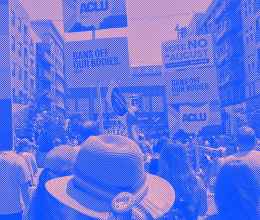CLEVELAND HEIGHTS, OH - The American Civil Liberties Union of Ohio sent Cleveland Heights Mayor Edward J. Kelley a letter today expressing concern over a portion of the city’s recently enacted curfew that may violate the First Amendment rights of young people. The provision requires youth to inform the police chief 24 hours before exercising their free speech rights in the Coventry Road and Cedar-Lee neighborhoods. Various courts have previously held that First Amendment rights cannot be subject to prior approval by local officials.
“While police have an important duty to maintain order, they can protect public safety while respecting free speech,” said ACLU of Ohio Legal Director James L. Hardiman. “Young Americans have expressed their political views since the Constitution was written, and can continue to do so peacefully and lawfully without being subjected to censorship by government officials.”
“Try as they might, officials cannot impose a curfew on the First Amendment,” added Hardiman. “Free speech cannot be free if law enforcement has the right to deny the right to protest to those with whom they may disagree. No government official should have the power to deny anyone’s right to express their beliefs.”
The U.S. Supreme Court previously ruled in Southeastern Promotions, Ltd. v. Conrad that municipalities may not enact systems that put a prior approval process on free speech. In addition, the Court later ruled in Cox v. State of Louisiana that those who wish to exercise their First Amendment rights should not be forced to seek advance permission from police.
The provision was added to Cleveland Heights curfew ordinance on July 5, 2011. The new curfew was adopted on an emergency basis after the city received complaints from some residents about some disorderly youth in the area. City Council will discuss the curfew further at its meeting on July 13, 2011.
“The courts are clear: it is simply unconstitutional to allow free speech to be at the discretion of government officials. While Cleveland Heights officials may have good intentions to attempt to protect public safety, they cannot sacrifice people’s First Amendment right to express their beliefs,” Hardiman concluded.






